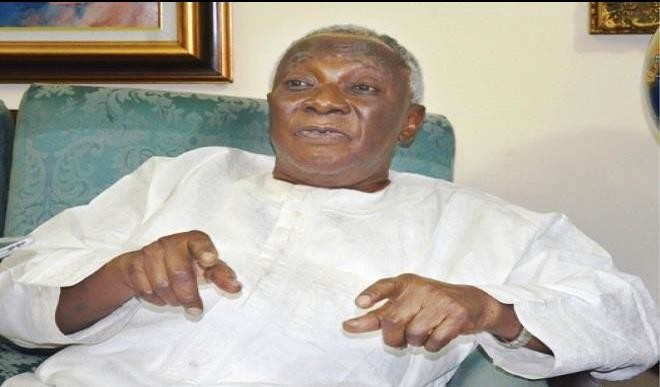Asiodu advises FG on Herdsmen-farmers crisis
Elder statesman, Chief Phillip Asiodu on Wednesday said cattle ranching remain the only solution to the constant confrontation between the herdsmen and farmers in the country. However, he said government can take up the challenge by establishing ranches which it would run and the success of it could propel the private sector to adopt the […]


Elder statesman, Chief Phillip Asiodu on Wednesday said cattle ranching remain the only solution to the constant confrontation between the herdsmen and farmers in the country.
However, he said government can take up the challenge by establishing ranches which it would run and the success of it could propel the private sector to adopt the project.
Asiodu who is the President, Board of Trustees of the Nigeria Conservation Foundation (NCF), spoke with Daily Trust on the sidelines of the 16th S. L Edu Memorial Lecture on Combating Illegal Wildlife Trade in Africa organized by the foundation.
The retired Permanent Secretary described the pastoralists-farmers’ crisis as the most urgent and most drastic challenge facing Nigeria which requires statesmanship, patriotism and honesty to address.
He recalled that he was instrumental to the launch of Bauchi meat in the First Republic where a processing centre for farting and slaughtering of meat was sited and the meat was being packaged and sent to Lagos while also being exported abroad.
According to him, if the programme had been continued by subsequent governments many of the centres would have been replicated across the country.
He added that the late Premier of Northern Region, Sardauna of Sokoto, Sir Ahmadu Bello had ranches incorporated in his programmes for the northerners.
According to him, government can lead the way by establishing ranches which could be privatized after two or three years.
Asiodu said, "So it is an urgent problem and even more drastic than any challenge facing us and I think we should have a statesmanship, patriotism and the honesty to address it.
"What does the son of a herdsman lose if now there is an agreed location linked with a processing complex where he will take his cattle? So instead of trekking 500, 800, 600 kilometres, he only does 50 km. And because he is not on the road, he can now go to school. He can upgrade his skills and he can now enjoy life.
"Government has to lead to say this should be done. Government doesn’t have to own but government could start one or two. For instance, the Bauchi meat was government majority but we were going to run it industrially and left to me even when government starts such thing, by the time it is proven to work, you can privatize.
"You can then sell majority to the private sector, maybe 55 but keep 45 to keep contributing from its profit".
He added: "I launched the Bauchi meat around 1970 in Bauchi where with cooperation with UNIDO, we had license to export meat products. What were we doing? We had these facilities to slaughter, package them properly and we were already sending them to Lagos, distributing them with carts to Ikoyi and all that.
"We would get cattle from Mambilla, from Chad, fart them. We would slaughter them; we would export to London districts, ditto Paris, New York.
"It was even in the time of First Republic was when Bauchi meat was conceived. The programmes the Sardauna Governor had for northerners involved ranches at designated areas. And when they got there, it is not just only grass, they would be given other nutrients. So that’s the way we should be going. The first and most important priority we can have for economic development and diversification is to modernize our agriculture, develop agro – allied industries, add values to agricultural products, that’s one.
Two, add values to oil and gas. Three, exploit out solid minerals. But how can u have a modernized farm, how can I guarantee my processing factory if tomorrow 500 cows with a herdsman can come and eat the cassavas before it has yielded, eat my maize?"
